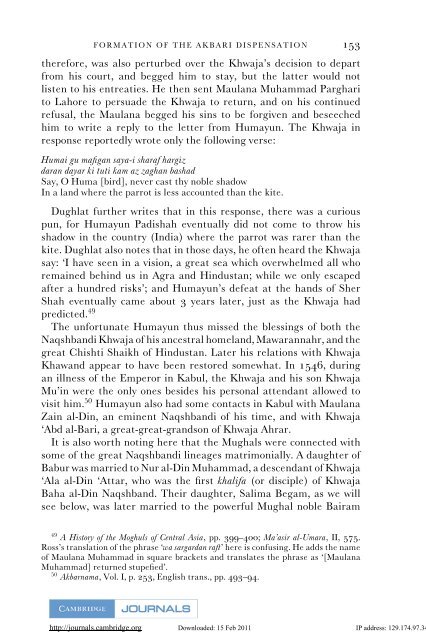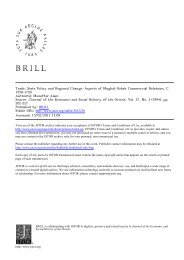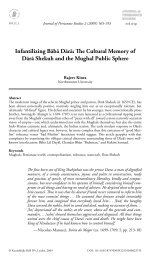The Mughals, the Sufi Shaikhs and the Formation of the Akbari ...
The Mughals, the Sufi Shaikhs and the Formation of the Akbari ...
The Mughals, the Sufi Shaikhs and the Formation of the Akbari ...
Create successful ePaper yourself
Turn your PDF publications into a flip-book with our unique Google optimized e-Paper software.
FORMATION OF THE AKBARI DISPENSATION 153<br />
<strong>the</strong>refore, was also perturbed over <strong>the</strong> Khwaja’s decision to depart<br />
from his court, <strong>and</strong> begged him to stay, but <strong>the</strong> latter would not<br />
listen to his entreaties. He <strong>the</strong>n sent Maulana Muhammad Parghari<br />
to Lahore to persuade <strong>the</strong> Khwaja to return, <strong>and</strong> on his continued<br />
refusal, <strong>the</strong> Maulana begged his sins to be forgiven <strong>and</strong> beseeched<br />
him to write a reply to <strong>the</strong> letter from Humayun. <strong>The</strong> Khwaja in<br />
response reportedly wrote only <strong>the</strong> following verse:<br />
Humai gu mafigan saya-i sharaf hargiz<br />
daran dayar ki tuti kam az zaghan bashad<br />
Say, O Huma [bird], never cast thy noble shadow<br />
In a l<strong>and</strong> where <strong>the</strong> parrot is less accounted than <strong>the</strong> kite.<br />
Dughlat fur<strong>the</strong>r writes that in this response, <strong>the</strong>re was a curious<br />
pun, for Humayun Padishah eventually did not come to throw his<br />
shadow in <strong>the</strong> country (India) where <strong>the</strong> parrot was rarer than <strong>the</strong><br />
kite. Dughlat also notes that in those days, he <strong>of</strong>ten heard <strong>the</strong> Khwaja<br />
say: ‘I have seen in a vision, a great sea which overwhelmed all who<br />
remained behind us in Agra <strong>and</strong> Hindustan; while we only escaped<br />
after a hundred risks’; <strong>and</strong> Humayun’s defeat at <strong>the</strong> h<strong>and</strong>s <strong>of</strong> Sher<br />
Shah eventually came about 3 years later, just as <strong>the</strong> Khwaja had<br />
predicted. 49<br />
<strong>The</strong> unfortunate Humayun thus missed <strong>the</strong> blessings <strong>of</strong> both <strong>the</strong><br />
Naqshb<strong>and</strong>i Khwaja <strong>of</strong> his ancestral homel<strong>and</strong>, Mawarannahr, <strong>and</strong> <strong>the</strong><br />
great Chishti Shaikh <strong>of</strong> Hindustan. Later his relations with Khwaja<br />
Khaw<strong>and</strong> appear to have been restored somewhat. In 1546, during<br />
an illness <strong>of</strong> <strong>the</strong> Emperor in Kabul, <strong>the</strong> Khwaja <strong>and</strong> his son Khwaja<br />
Mu’in were <strong>the</strong> only ones besides his personal attendant allowed to<br />
visit him. 50 Humayun also had some contacts in Kabul with Maulana<br />
Zain al-Din, an eminent Naqshb<strong>and</strong>i <strong>of</strong> his time, <strong>and</strong> with Khwaja<br />
‘Abd al-Bari, a great-great-gr<strong>and</strong>son <strong>of</strong> Khwaja Ahrar.<br />
It is also worth noting here that <strong>the</strong> <strong>Mughals</strong> were connected with<br />
some <strong>of</strong> <strong>the</strong> great Naqshb<strong>and</strong>i lineages matrimonially. A daughter <strong>of</strong><br />
Babur was married to Nur al-Din Muhammad, a descendant <strong>of</strong> Khwaja<br />
‘Ala al-Din ‘Attar, who was <strong>the</strong> first khalifa (or disciple) <strong>of</strong> Khwaja<br />
Baha al-Din Naqshb<strong>and</strong>. <strong>The</strong>ir daughter, Salima Begam, as we will<br />
see below, was later married to <strong>the</strong> powerful Mughal noble Bairam<br />
49 A History <strong>of</strong> <strong>the</strong> Moghuls <strong>of</strong> Central Asia, pp. 399–400; Ma’asir al-Umara, II, 575.<br />
Ross’s translation <strong>of</strong> <strong>the</strong> phrase ‘wa sargardan raft’ here is confusing. He adds <strong>the</strong> name<br />
<strong>of</strong> Maulana Muhammad in square brackets <strong>and</strong> translates <strong>the</strong> phrase as ‘[Maulana<br />
Muhammad] returned stupefied’.<br />
50 Akbarnama, Vol.I,p.253, English trans., pp. 493–94.<br />
http://journals.cambridge.org Downloaded: 15 Feb 2011 IP address: 129.174.97.34






